A Consumer Guide to the Trailing Edge: February, 2012
Recycled Goods (#94)
by Tom Hull
Two compilations I treated myself to around Christmas, both tied to treasured books. Yet another stroll through the Impulse catalog -- I took a pretty extensive look at them back in August, 2006. Some more odds and ends. Haven't really figured out how to make this column work, but it's still an interesting grabbag.
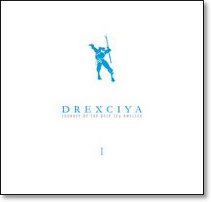 |
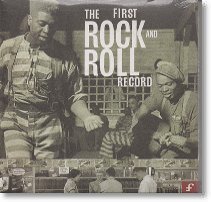 |
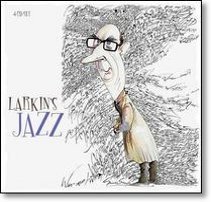 |
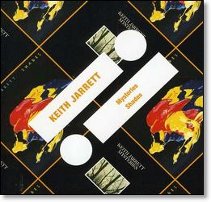 |
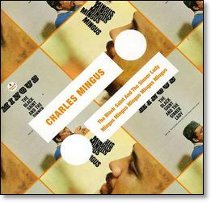 |
Drexciya: Journey of the Deep Sea Dweller, Vol. 1 (1992-96 [2011], Clone Classic Cuts): Detroit techno group, Gerald Donald and James Stinson, worked until Stinson died in 2002. This is the first of four planed compilations, picking through early EPs and singles, mostly with water themes. The electronics go blip, not much sustain or ambience, just picking out short and sweet themes, bouncing along. A- [R]
The First Rock and Roll Record (1916-56 [2011],
Famous Flames, 3CD): In 1992 Jim Dawson and Steve Propes wrote a
short book which asked the question, What Was the First Rock
'n' Roll Record. They nominated 50 records from 1944 through
Elvis Presley's "Heartbreak Hotel" in 1956 -- can't imagine any
doubt there, but working back what about "Maybelene" and "Tutti
Frutti" and "Bo Diddley" in 1955, "Rock Around the Clock" and
"Shake Rattle and Roll" in 1954, Big Mama Thornton's "Hound Dog"
in 1953, "Rocket 88" in 1951, "Drinkin' Wine Spo-Dee-O-Dee" in
1949, "Good Rockin' Tonight" in 1948, Big Boy Crudup's "That's
All Right" in 1946, Helen Humes' "Be Baba Leba" in 1945? Dawson
and Propes start their list with "Blues, Part 2" from the first
Jazz at the Philharmonic concert in 1944, a rousing jump blues
with Illinois Jacquet and Jack McVea dueling on tenor sax, but
they could have gone back further. I would have been happy with
that playlist on two discs, which is approximately what discs
two and three do here: 36[1] songs from the book appear here, the
other 14 replaced with 21 similar songs (not that there's anything
quite comparable to John Lee Hooker's "Boogie Chillen" or Professor
Longhair's "Mardi Gras in New Orleans" or Johnnie Ray's "Cry" or
Hank Snow's "I'm Movin' On," but Lionel Hampton's "Blues, Pt. 2"
shares Jacquet with the JATP version, and Muddy Waters and Hank
Williams can be swapped with no loss). The first disc provides
some archeology in "The Camp Meeting Jubilee" then gets down to
business with Trixie Smith's "My Man Rocks Me." After that you
get a bit of everything, especially if it has "rock" and/or "roll"
in the title (as in Sister Rosetta Tharpe's "Rock Me" and Big Joe
Turner's "Roll 'Em Pete), or at least some "boogie" (as in the
Andrews Sister's "Boogie Woogie Bugle Boy"). My main caveat is that
anyone who knows this material would sort through it variously,
but all three discs are full of delights.
[1] Booklet claims 37, so they count the Hampton "Blues, Pt. 2" --
but the book clearly cites the JATP performance with Jacquet, McVea,
Nat King Cole, Les Paul, Johnny Miller, and Lee Young (Cole and Paul
working under pseudonyms), eventually released on CD as Jazz at
the Philharmonic: The First Concert.
A-
Larkin's Jazz (1925-59 [2010], Proper, 4CD): Philip Larkin was an English poet, 1922-85, enough of a celebrity that his adopted hometown, Kingston upon Hull, threw a festival in honor of the 25th anniversary of his passing. I can't speak to his poetry, but I read his very informal All What Jazz: A Record Diary as I was first starting to write about jazz myself, and found it most gratifying: at a time when virtually nothing I read about bebop (and Charlie Parker in particular) aligned with what I was hearing, Larkin's diffidence was a revelation. In the end, he turned out to be a better guide to the pre-bop jazz he favors than a critic of bop and post-bop, but he's not too shabby as long as the music doesn't get too ugly. Still, this compilation of favored tunes will cement his reputation as an old fogey. I probably shouldn't have snapped it up so quickly -- I doubt that there's anything here other than an Earl Bostic piece on the 4th disc that I didn't already own -- but score one for stirring up the pot. And while I would have preferred more swing -- he leans trad up through Bechet, Condon, and Pee Wee Russell but does acknowledge Goodman and Shaw (if not Jimmie Lunceford) -- everything here hits the spot: perhaps fittingly, none more than a trio of Billy Banks songs on the 2nd disc. A-
T.P. Orchestre Poly-Rhythmo: The Kings of Benin Urban Groove 1972-80 (1972-80 [2004], Soundway): Early material by a still extant -- despite various name changes -- group from the thin sliver of land between Nigeria and Ghana, offering bits of highlife and afrobeat without defining either. The early cuts are sonically dull, but even there they start to win you over, and when the sound brightens up they're even more effective, but never quite what you'd call Tout Puissant. B+(***) [R]
In Series:
Back in October, 2011, I reviewed a batch of Impulse 2-for-1 reissues. Impulse was a big budget jazz label founded under ABC Records -- soon merged into MCA, ultimately landing in Universal's Verve Music Group -- in 1960. Nowadays it's mostly remembered for John Coltrane's often astonishing work, but they recorded many jazz notables, especially in the early 1960s, with quantity and quality falling off especially into the 1970s (the Keith Jarrett groups a notable exception). The second batch -- like the first, 15 sets covering 30 albums -- came out in Europe in November and in the US in January.
Marion Brown: Saxophonist, alto first but played a lot of soprano, cut his remarkable early albums for ESP-Disk in the mid-1960s, but rarely had a steady label -- one Impulse in 1966, one ECM in 1970, two more Impulses here, everything else on minor foreign labels up to his death in 2010, with some of his best records duos with Mal Waldron.
- Geechee Recollections (1973): Wrapped around a piece of poetry by Jean Toomer (spoken by Bill Hasson), an understated piece of chopped and clipped rhythm, rarely drawing out the leader's sax or whatever it is Leo Smith allegedly does. B+(**)
- Sweet Earth Flying (1974): Two side-long pieces, one centered around another Jean Toomer poem, with a twin-piano (sometimes electric, or organ) lineup -- Muhal Richard Abrams and Paul Bley, no less -- and Steve McCall (again) on drums, but more focus on the sax, the soprano especially striking. B+(***)
- Twofer: ([2012], Impulse): B+(***) [R]
Mel Brown: Blues guitarist, best known for working with Bobby "Blue" Bland. Teamed with Herb Ellis for a soul jazz album in 1967 called Chicken Fat, and that got him a couple more shots.
- The Wizard (1968): Second guitarist here was Terry Evans, but they rarely do anything interesting enough to keep you from wondering when will the singer show up. Organist is so indistinct the label didn't bother to give the credit. B-
- Blues for We (1969): Even fewer credits here, although the singer on "Twist and Shout" is reported to be Brown himself -- a mistake he doesn't repeat. Chintzy pop like "Ob-La-Dee, Ob-La-Da" even more rote than its predecessor, although eventually you become enured to such things. C+
- Twofer: ([2012], Impulse): C+ [R]
Alice Coltrane: Née Alice McLeod, a pianist from Detroit, married John Coltrane in 1965, joined his group, and recorded her own albums after his death in 1967.
- Huntington Ashram Monastery (1969): Opens with a typical Coltrane riff wrapped in harp, a clever effect not least because it isn't overdone. Most of what follows is piano trio, with Ron Carter and Rashied Ali slightly on edge, and dense, fleet, and eloquent work by the leader. B+(**)
- World Galaxy (1971): Opens and closes with iconic Coltrane pieces -- "My Favorite Things" and "A Love Supreme" -- surrounding three "Galaxy" titles with Indian references. Mostly dense layers of organ, harp, and strings, perhaps meant for meditation but a cloying backdrop, although Frank Lowe and Leroy Jenkins manage to break through with an isolated solo apiece. B
- Twofer: ([2012], Impulse): B+(*) [R]
Sonny Criss: An alto saxophonist, picked up bebop in Charlie Parker's immediate wake, recorded in erratic but impressive spurts -- 1956 for Imperial, 1966-69 for Prestige, 1975-76 for Muse -- but his last two albums for Impulse served him poorly before his tragic death at age 50.
- The Joy of Sax (1976): The synths, strings, and electric pulse are bogus trimmings, but at least this focuses on the sax, and his appeal is strong and clear. Two Stevie Wonder songs, one with a tolerable vocal. B
- Warm and Sonny (1976): More keybs, more synths, more backing horns, songs like "The Way We Were" and "Sweet Summer Breeze" and EWF's "That's the Way of the World" -- goop that the alto sax can only occasionally rise above, and rarely does. C
- Twofer: ([2012], Impulse, 2CD): C+ [R]
Chico Hamilton: Drummer from Los Angeles, led his own bands from 1955 on, often featuring flute and/or guitar for a light, airy sound, often with Latin percussion.
- El Chico (1965): Floats along nicely with Willie Bobo and Victor Pantoja spicing up the percussion, opening up for tasty solos by guitarist Gabor Szabo, as well as flute and alto sax by Sadao Watanabe. B
- The Further Adventures of El Chico (1966): Ten cuts, only three topping 4:00, with scattered lineups, some like outtakes, some dabbling in saccharine pop hits ("Daydream," "Monday Monday"). Gabor Szabo and Charlie Mariano have some nice moments, but only Clark Terry's got his mojo working. B-
- Twofer: ([2012], Impulse): B- [R]
John Handy: An alto saxophonist, originally from Dallas but long based in San Francisco; perhaps best known for his stint with Mingus, although his 1965 Live at the Monterey Jazz Festival has its fans. He has a couple dozen widely scattered albums, some bop, crossover, world fusion, unified only by his sweet tone and disposition.
- Hard Work (1976): Swept up in Impulse's crossover phase, Handy works hard to keep the sax flying high and his undistinguished band's funk deep in the groove. And while vocals usually ruin these things, he makes them work too. B+(*)
- Carnival (1977): Intended to be his funk party album, filled up with even more keybs and congas and vocals, the it works best when they keep the structure clean, as with "Watch Your Money Go" -- a blues chant lit up by Handy's soaring sax solo. And on ballads like "Make Her Mine" Handy's vocals are a pleasant surprise -- he's much more pleasing than, to pick an apposite example, George Benson. B
- Twofer: ([2012], Impulse): B [R]
Freddie Hubbard: Trumpeter, emerged fully formed in 1960 as a top-notch hard bop player who could play anywhere, even avant-garde slots. He mostly headlined on Blue Note, but for a five-year stretch he showed up everywhere, and was rarely less than stellar.
- The Artistry of Freddie Hubbard (1962): This couldn't have taken long to arrange: six young hard bop stars -- John Gilmore the most interesting choice -- stretching out on two standards and three briefer Hubbard tunes. "Caravan" is crackling, but "Summertime" gets lost and drags a bit. B+(*)
- The Body and the Soul (1963): I suppose Bob Thiele's idea here was to feature Hubbard in a swishy orchestral setting like Gil Evans concocted for Miles Davis, but Wayne Shorter's charts are a wet blanket for everyone. The three (of nine) cuts where Shorter just plays are sharper but still prone to clutter, although occasionally you get a glimpse of how much talent is wasted here (e.g., Eric Dolphy and Cedar Walton). C+
- Twofer: ([2012], Impulse): B- [R]
Keith Jarrett: A tour de force in the early 1970s, bouncing between stellar quartets on both sides of the Atlantic, cranking out the best-selling solo piano album of all time. By late 1975 his American Quartet -- Dewey Redman on tenor sax, Charlie Haden on bass, Paul Motian on drums -- had picked up a fifth, percussionist Guilherme Franco.
- Mysteries (1975): Four cuts are framed by Redman's intensely expressive sax, with the pianist so abstract you'd think he had finally found a way to one-up Motian. In between, Jarrett picks up a Pakistani flute on "Flame" and literally breaks out of his world. A-
- Shades (1975): Same group, may even be from the same session, but it's hard to tell which takes are out and in -- except, that is, for "Diatribe," which is as far out as this group ever got, rough and raging, something you always knew Redman had in him. B+(***)
- Twofer: ([2012], Impulse): A- [R]
Charles Mingus: A brief stopover in the great bassist's career: the other album he did for Impulse was his solo Mingus on Piano -- his most minimal of recordings, whereas these two Bob Thiele productions are his most maximal.
- The Black Saint and the Sinner Lady (1963): A suite for eleven musicians, not technically a big band but in Mingus's hands a huge sprawling monster. I've always found the "love, pain, and passioned revolt" of the finale a bit too chaotic, but many fans rank this as his masterpiece. A-
- Mingus Mingus Mingus Mingus Mingus (1963): Basically the same large band, with Booker Ervin and Eric Dolphy added to the reed section, but deprecated a bit because he tends to rework old material. Still, with such a band, and such material -- including key pieces from my pick for his masterpiece, Mingus Ah Um -- why the fuck not? A-
- Twofer: ([2012], Impulse): A- [R]
Blue Mitchell: One of the great hard bop trumpeters who peaked in the early 1960s, less flashy than Lee Morgan, more reliable than Booker Little, but like them died young -- at 49, just not as young. He did manage to keep working steady in the 1970s, recording more than a dozen albums nobody seems to think much of, most with "blue" or "funk" in the title.
- African Violet (1977): Hard to fault the trumpet here, or the sax when Harold Land lends a hand, but they're wrapped up in synths that none of their rhythm options can redeem, nor can they do much with the unjazzable Stevie Wonder. B-
- Summer Soft (1978): The title song another Stevie Wonder song turned into a gaudy piece of disco trash; nor does moving the beat to the one help much, nor does focusing on the trumpet. C-
- Twofer: ([2012], Impulse, 2CD) C [R]
Oliver Nelson and Friends: A saxophonist from St. Louis, Nelson started recording in 1959 and was prolific until his death in 1975, mostly arranging big band sessions, some under his own name -- Blues and the Abstract Truth is his masterpiece -- and many not. The "Friends" here reflect co-credits but his hand is unmistakable.
- Happenings (1966): Originally credited to "Hank Jones & Oliver Nelson" but also "featuring Clark Terry," whose big-band trumpet is seamless, but whose vocal on "Winchester Cathedral" is the record's great novelty moment. Jones offers a fine piano feature, but he spends most of the album playing electric harpsichord in arrangements that are remarkably polished but also corny and occasionally ridiculous. B
- Soulful Brass (1968): The credit here reads "Oliver Nelson & Steve Allen": Allen seamlessly picks up the electric harpsichord so it takes a while before you recognize how much shlockier his is -- specifically, "Can't Take My Eyes Off You," magnificent even here. Allen might have been deemed a Renaissance Man but TV exposure made it look like all the things he could do were some kind of camp -- and that's what he winds up playing off of here. Nelson, of course, makes the joke even grander, not because he has a sense of humor but because he always makes everything grander. B+(*)
- Twofer: ([2012], Impulse): B+(*) [R]
Howard Roberts: Guitarist, born in Phoenix, played in West Coast groups eventually winding up in Seattle. Has a light discography, including one 1966 album on Verve (The Velvet Groove) and one 1978 album on Concord (The Real Howard Roberts), as well as these two.
- Antelope Freeway (1971): Snatches of radio noise and talk put this on the highway, while the metallic guitar suggests steel-belted radials, tenaciously grabbing the road through whatever keyb sleet and slick comes their way. B+(*)
- Equinox Express Elevator (1972): Haven't been able to track down credits, but the guitar is more like Roberts' old pal Barney Kessel than McLaughlin or Hendrix, and it weaves its way over electric keybs that are pleasant and sometimes surprise you. B+(*)
- Twofer: ([2012], Impulse): B+(*) [R]
Sonny Stitt: A contemporary of Charlie Parker, with ideas so similar he was often accused of copying, but he lasted much longer and recorded extensively, often playing tenor instead of alto sax, often engaging in blistering cutting contests.
- Now! (1963): A very typical Stitt quartet with the impeccable Hank Jones on piano, Al Lucas on bass, and Osie Johnson on drums, never rushed or frenetic but solid all around. B+(*)
- Salt and Pepper (1963): With Jones and Johnson again, Milt Hinton taking over bass, and Duke Ellington's tenor saxophonist Paul Gonsalves sitting in; Stitt is more deferential than usual, making this a session to savor his underrecorded guest. A-
- Twofer: ([2012], Impulse): B+(***) [R]
Clark Terry: Trumpet player, came up in the bop era and made his first great album with Thelonious Monk, but got a good grounding in swing working both for Count Basie and Duke Ellington.
- The Happy Horns of Clark Terry (1964): What makes him happy is playing Ellington (and Carney and Tizol and Hodges), especially when Ben Webster sits in. B+(**)
- It's What's Happenin' (1967): Subtitled The Varitone Sound of Clark Terry, this quartet session was meant to demo Selmer's Varitone amplifier on trumpet -- the device, a sound processesor, was more commonly used with saxophones. The gear doesn't get much of a workout -- the instrumental pieces are uncommonly nice, but "Electric Mumbles" plays games with Terry's voice, and his rap on "Take the 'A' Train" goes further. B+(*)
- Twofer: ([2012], Impulse): B+(**) [R]
Michael White: Violinist, had an angle on world fusion when it first emerged in the early 1970s, recording five 1971-74 Impulse albums plus side shots with Pharoah Sanders and Alice Coltrane, but hasn't recorded much since.
- Spirit Dance (1972): Scattered pieces assay Latin and African themes, the "Samba" dull and repetitive, but elsewhere the percussion works and the violin cuts harshly against the grain in what could be avant as well as exotic; "Praise Inocence" keys off an out-of-tune kiddie choir, but winds up with pianist Ed Kelly reinventing Dollar Brand. B+(*)
- Pneuma (1972): The first side a five-part suite lost in space. Interest picks up on the second side along with the beat. B
- Twofer: ([2012], Impulse): B [R]
Briefly Noted
Dee Bell: Sagacious Grace (1990 [2011], Laser): Standards singer, writes occasional lyrics, cut a couple albums for Concord in the 1980s then this shelved session with Al Plank on piano, John Stowell on guitar, and the always delectable Houston Person on tenor sax; poise and soul. B+(*)
Tim Berne's Bloodcount: Poisoned Minds: The Paris Concert (1994 [1995], JMT): The second of three installments, running through two long pieces with many smaller sections, Berne's alto and baritone saxes entwined with Chris Speed's tenor or clarinet, while the guitar-bass-drums rhythm section hops all over the place. B+(*)
Tim Berne's Bloodcount: Memory Select: The Paris Concert (1994 [1995], JMT): Part trois, same group, with two more long pieces; the main problem is that the often interesting music struggles to be heard through quiet patches that would have been clearer in person. B
Luke Haines: Das Capital: The Songwriting Genius of Luke Haines and the Auteurs (2003, Hut): Solo remakes, mostly of songs from Haines' 1993-96 art-disco group Auteurs, mostly a bit slower with a gasp and a leer; tempting, but every time I am I soon recall that the version I'd rather hear is the original. B
Jack Ruby: Jack Ruby (1974-77 [2011], UgExplode EP): Proto-no wave group with Contortions bassist George Scott, a singer named Robin Hall, and some others I don't recognize; four studio tracks from 1974 when their grind and random crash noises were ahead of their time, and four rehearsal tracks from 1977 after they had learned to twiddle the amplifier knobs -- a quantum leap forward, at least until the amp started to bite back. B+(***) [R]
The J.B.'s & Fred Wesley: The Lost Album (1972 [2011], Hip-O Select): James Brown's band taking it easy under the direction of Fred Wesley, whose trombone leads get their fair share of time; the instrumentals don't go the extra mile they need to, but a couple of vocal slots grease the skids, even if it's just jive. B+(*) [R]
The Lijadu Sisters: Danger (1976 [2011], Knitting Factory): Identical twins from Nigeria, considered Afrobeat which as much as anything means they sound like 1960s garage rockers, at least from the keyb down, although they try to synch their voices into something more haunting. B+(*) [R]
Legend: B+ records are divided into three levels, where more * is better. [R] indicates record was reviewed using a stream from Rhapsody ([X] is some other identified stream source; otherwise assume a CD). The biggest caveat there is that the packaging and documentation hasn't been inspected or considered, and documentation is especially important for reissues. But also my exposure to streamed records is briefer and more limited, so I'm more prone to snap judgments -- although that's always a risk.
For this column and the previous 93, see the archive.
Copyright © 2012 Tom Hull.